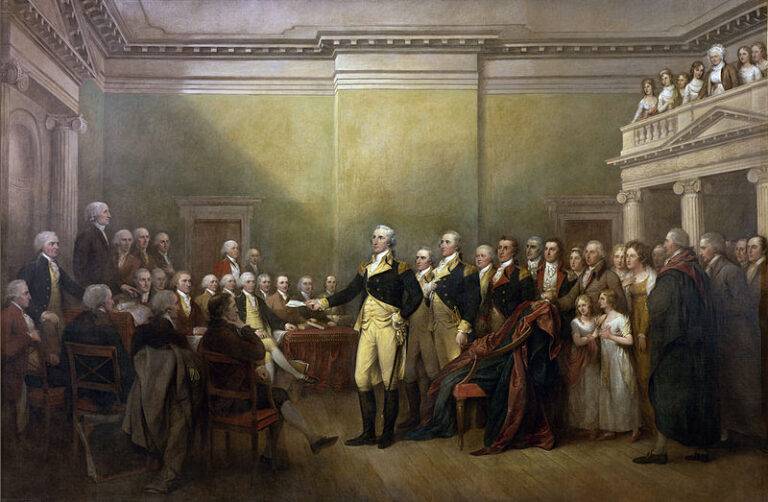164 B.C. The Jewish general Judas Maccabeus restores proper worship to the Temple in Jerusalem. The event is celebrated annually during Hanukkah.
316 A.D.: Consecration of Old Saint Peter’s Basilica in the outskirts of Rome. The building was a classical Romanesque structure, heavily timbered, and built over the tomb of the relatively recently martyred Apostle Peter (who was crucified upside down).
1307: Traditional date when Swiss patriot William Tell refused to bow down to the hat of Hermann Gessler, one of the functionaries of the Hapsburg Empire who was trying to cow the Swiss confederation into submission. Arrested for this disrespect, Gessler promised Tell his freedom if he could shoot an apple off his (Tell’s) son Walter’s head. With Walter tied to a stake, Tell drew out two bolts for his crossbow, and successfully split the apple. When Gessler asked why he drew two arrows instead of one, Tell replied defiantly that if he failed his shot at his son, the next one would be into the heart of Gessler himself. Tell remains a potent symbol of resistance to capricious authority, and has been the subject of numerous plays and books on the nature of freedom and patriotism.
1421: The Saint Elizabeth’s Day Flood inundates a huge section of Zeeland and Holland as the storm-driven Zuider Zee breaks through several dykes and floods the surrounding lands. Casualty estimates range from 2000, to 10,000, and the ruined villages and farmlands in the flooded polders remained underwater for decades. Most of the flooding concentrated in the areas of Dordrecht and North Brabant.
1533: Spanish conquistador Francisco Pizzaro and his army arrive in the Inca Empire. As with his more famous (in the U.S.) compadre Hernando Cortez, he is not scouring the Andean empire for its archeological treasures per se, but for its incredible treasures, period. The Incas are particularly rich in silver, and the quantity of plunder that makes its way back to enrich the coffers of Spain also sets in motion an inflationary spiral that nearly wrecks the economies of Europe.
1626: After 120 years of construction (begun in 1506) the new Basilica of Saint Peter is consecrated in Rome’s Vatican City, replacing the crumbling 1300 year old original basilica. The complications of its design and construction, being built over and around the original while leaving key sections of it in place, set the scope and scale of this project above and beyond anything that had been planned before. Host to some of the most beautiful and famous artwork in the world, to say nothing of the staggering Christian heritage resident within its walls and catacombs. It was also expensive, and the “creative financing” it took to complete its construction set the stage for a train of corruption and abuses that led to the Protestant Reformation.
1694: Birth of the French intellectual and writer Francois-Marie Arouet, better known by his nom de plume, Voltaire (d.1778). He was famous for his acerbic wit, and was an outspoken advocate for civil liberties, free trade, freedom of religion, all of which were prominent among the core values of the Scottish Enlightenment, except that Voltaire wrote in France. He moved in the highest circles of intellect and politics, spending over two years in the court and the private table of Prussian King Fredrick the Great, among others. His work greatly influenced the thinking of Virginia’s Thomas Jefferson and other leading lights of the American Revolution.
1719: Birth of Leopold Mozart (d.1787), father and “Chief Agent” of his child prodigy son, Wolfgang Amadeus. Have you ever wondered about the parents of some of the great names in particular fields of excellence? This is one of them to really wonder about.
1739: Ships of the Royal Navy descend on and capture the Spanish fortress city of Porto Bello in Panama. The lopsided battle was hailed as a great victory in England, and served as the first step of revenge in the War of Jenkins’ Ear (1739-1748) between Spain and Great Britain. The war was eventually subsumed by the larger War of Austrian Succession.
1763: Charles Mason and Jeremiah Dixon begin surveying the line that now bears their name. The survey was a Crown solution to a long-simmering border dispute between the colonies of Pennsylvania and Maryland. Its primary goal was to clearly define the demarcation between Maryland and Pennsylvania in the western watershed of the Chesapeake, and to separate out the “south counties” of Pennsylvania that then became the separate colony of Delaware. When Pennsylvania abolished slavery, the Mason-Dixon Line and the Ohio River became the de facto border between slave and non-slave states. At that issue heated up in the mid-19th century, the line also came to represent the cultural divide between North and South.
1765: Birth of Robert Fulton (d.1815). American engineer and inventor who is widely credited with developing the world’s first commercially successful steamboat, the North River Steamboat.
1775: American Revolutionary hero and Colonel of New Hampshire’s Green Mountain Boys, Ethan Allen leads a night attack against Montreal. Unfortunately for Allen, not only did the commander of the British garrison get early word of the attack, but half of the American force fails to cross the St. Lawrence River in execution of their plan. Outnumbered, out-gunned, and out-foxed, Allen was compelled to surrender, remaining imprisoned through 1778.
1777: 16 months after declaring independence from Great Britain, the Continental Congress adopts the Articles of Confederation as its governing document.
1789: New Jersey becomes the first state to ratify the Bill of Rights.
1820: The Nantucket whaling ship Essex, on station in the South Pacific, is repeatedly rammed by an enraged sperm whale and sinks. The story of the sinking and the subsequent survival of members of the crew was part of Melville’s inspiration for Moby-Dick.
1850: Birth of British author Robert Louis Stevenson (d.1894).
1851: Publication of Herman Melville’s novel Moby-Dick. Moby-Dick; or, The Whale is an 1851 epic novel centered on the sailor Ishmael’s narrative of the maniacal quest of Ahab, captain of the whaling ship Pequod, for vengeance against Moby Dick, the giant white sperm whale that bit off his leg on the ship’s previous voyage.
1855: Scottish explorer and missionary David Livingstone becomes the first European to see Victoria Falls. He becomes “lost” a decade and a half later.
1862: Acting in his legal capacity of Commander and Chief, President Lincoln personally approves General Ambrose Burnside’s plans to capture Richmond; in particular, Burnside’s line of attack across the Rappahannock River at Fredericksburg.
1865: Mark Twain publishes in the New York Saturday Press the short story that put him on the map: The Celebrated Jumping Frog of Calaveras County.
1869: Inauguration of commercial shipping traffic through the Suez Canal.
1871: The National Rifle Association is chartered by the State of New York.
1884: The Berlin Conference opens. Beginning as a forum to establish trade regulations in Africa, it quickly turned into a scramble to define Europe’s burgeoning colonial interests in the continent. The conference’s General Act focused on the territories in and around the Congo River and marked out distinct spheres of influence and control for the colonial powers. By the end of the 19th Century, only Liberia, Orange Free State, Transvaal and Abyssinia remained independent from direct colonial rule.
1887: Birth of Bernard Montgomery (d.1976), British Field Marshal during the Second World War, hero of El Alamein, Sicily, Normandy, and the British drive against the German army across the northern tier of Europe.
1889: Birth of Jawaharlal Nehru (d.1964), first Prime Minister of India. Much of the leadership of today’s Congress Party are direct descendants of Nehru.
1891: Birth of German Field Marshall Erwin Rommel (d.1944), the Desert Fox.
1901: The Riker Torpedo Racer sets a world speed record for electric cars at 57 mph.
1910: Aviation pioneer Eugene Ely makes the first takeoff of an aeroplane from a ship, launching off of a specially constructed wooden platform over the forward turrets of USS Birmingham (CL-2) right here in Hampton Roads, in the anchorage just off of the Hampton Bar.
1916: Commander of the British Expeditionary Force (BEF) in Flanders, Field Marshall Douglas Haig, orders a halt to the First Battle of the Somme, which began, you’ll recall, on July 1st “when the barrage lifts…” The four and a half months since of nearly continuous combat yielded for the combined Anglo-French force a total of six miles over the ground, without having gained any of the originally planned objectives, at a cost of over 146,000 dead and just under 624,000 wounded. For their part, the Germans lost 164,000 dead and 465,000 wounded defending their earlier gains
1920: First General Assembly meeting of the League of Nations.
1920: Birth of Stan “The Man” Musial (d.2013), the great first baseman for the Saint Louis Cardinals, 1941-1963.. 24-time All Star, 3-time National League MVP, and player for three World Series wins for the Cardinals.
1920: The “Free City of Danzig” is formed under the protection of the League of Nations. The Free City of Danzig was a semi-autonomous city-state established by the Treaty of Versailles in 1920, which existed until 1939. Located on the Baltic Sea, it was under the protection of the League of Nations but had special administrative ties and a customs union with Poland. Despite being mostly ethnically German, its unique status created ongoing tensions that culminated in its annexation by Nazi Germany, which triggered the start of World War II.
1920: In Dublin, the Irish Republican Army assassinates 12 British informants who worked with the Royal Irish Constabulary to help put down rebellion that was raging throughout Ireland. In response, a vigilante militia group of “Black & Tans” from the RIC burst into a stadium during a football match and fired several hundred rounds into the crowd, killing 14 and wounding upwards of 80 civilians. The event became known as Bloody Sunday, and served to harden against the Crown those souls whose earlier sympathies during the revolt had been ambivalent.
1927: The Holland Tunnel opens to traffic, becoming the first tunnel linking New York and New Jersey.
1928: Walt Disney releases into movie theaters his third animated short, Steamboat Willie, which combines synchronized sound with the dancing images of his soon-to-be famous mouse. [
1933: After sixteen years of increasingly futile opposition* to the entrenchment and bureaucratization of the Bolsheviks into Russian society and government, the United States finally recognizes the Soviet Union. The intelligentsia in the United States had been lobbying for this recognition for years, epitomized by journalist Lincoln Steffens visiting Russia in 1921 and coming back gushing,
“I have seen the future and it works.” Pretty much a test case for Stalin’s amusement at the
“useful idiots” in the Western press. Steffens recanted his enthusiasm as the New Deal took hold in the States.
1940: The Coventry Blitz– over 500 Luftwaffe sorties throughout the night pulverize the ancient factory town of Coventry, including its famous Cathedral.
1945: Working under the cover of secrecy, 88 German rocket scientists are spirited from their cells in occupied Germany and into the United States. They remained in “protective custody” while they performed work on technology of “vital national interest.” The scientists were specifically tasked to develop a rocket program faster, farther and better than the Soviets could get with their captured Nazis.
1947: Great Britain’s Princess Elizabeth weds Phillip Mountbatten.
1959: Opening night on Broadway for The Sound of Music.
1960: USS George Washington (SSBN-598) submerges to begin her first Polaris deterrent patrol. She rises to the surface again 66 days later, having not fired a shot.
1961: President John F. Kennedy, in order to avoid an open-ended commitment of combat forces, orders an increased contingent of military advisors to aid the government of South Vietnam.
1961: President John F. Kennedy, signs off on his earleir order, assigning 18,000 U.S. Army advisors to South Vietnam.
1969: Launch of Apollo 12, with astronauts Pete Conrad, Richard Gordon and Alan Bean. The Saturn V rocket was hit by lightning during the ascent phase, tripping a circuit breaker and leaving the command module without power for a short time.
1975: Death of General Francisco Franco (b.1892). Franco declared himself Caudillo of Spain at the close of the Spanish Civil War in 1936. His close ties with Nazi Germany during the civil war, his studious neutrality during WWII, and his strident anti-communism made him a particular object of left-wing loathing. In his later years he re-established a representative parliament and set the conditions for a restoration of the Bourbons under a constitutional monarchy.
1990: Newly reunited Germany signs a treaty with Poland confirming the post-WW2 Oder-Neisse Line as the permanent border between the two countries.




Based on what we have read, no one has, attempted to scare you or intimidate you. All of us are…
For someone that's against what I'm doing, you gave yourself away that you've READ IT ALL, only way you'd know…
And how old are those of you acting like middle school bullies? I tell it like it is. You obviously…
WRONG ‼️GENTRIFICATION IS VERY PURPOSEFULLY PERSONAL‼️
You really need to stop the name calling. You are actually older than Adam Hamilton's mother. So maybe you need…